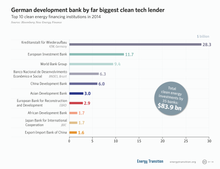Development finance institution: Difference between revisions
Loaner Tags: Reverted Visual edit Mobile edit Mobile web edit |
Undid revision 1090072179 by 41.223.73.232 (talk) Advertising |
||
| Line 1: | Line 1: | ||
{{Short description|Banking company that provides risk capital for economic development projects}} |
{{Short description|Banking company that provides risk capital for economic development projects}} |
||
[[File:Top 10 clean energy financing institutions 2014.png|thumb|Top 10 clean energy financing institutions 2014]] |
[[File:Top 10 clean energy financing institutions 2014.png|thumb|Top 10 clean energy financing institutions 2014]] |
||
A '''development financial institution''' ('''DFI'''), also known as a '''development bank''' or '''development finance company''' ('''DFC'''), is a [[ |
A '''development financial institution''' ('''DFI'''), also known as a '''development bank''' or '''development finance company''' ('''DFC'''), is a [[financial institution]] that provides [[risk capital]] for [[Economic development|economic development projects]] on a non-commercial basis. |
||
{{as of|2005}}, total commitments (as loans, equity, guarantees and debt securities) of the major regional, multilateral and bilateral DFIs totaled US$45 billion (US$21.3 billion of which went to support the private sector).<ref name="ODI" /> |
{{as of|2005}}, total commitments (as loans, equity, guarantees and debt securities) of the major regional, multilateral and bilateral DFIs totaled US$45 billion (US$21.3 billion of which went to support the private sector).<ref name="ODI" /> |
||
Revision as of 19:48, 28 May 2022

A development financial institution (DFI), also known as a development bank or development finance company (DFC), is a financial institution that provides risk capital for economic development projects on a non-commercial basis.
As of 2005[update], total commitments (as loans, equity, guarantees and debt securities) of the major regional, multilateral and bilateral DFIs totaled US$45 billion (US$21.3 billion of which went to support the private sector).[1]
Mandate
DFIs can play a crucial role in financing private and public sector investments in developing countries, in the form of higher risk loans, equity positions, and guarantees.[1]
DFIs often provide finance to the private sector for investments that promote development and to help companies to invest, especially in countries with various restrictions on the market.[1]
Some development banks include socially responsible investing and impact investing criteria into their mandates. Governments often use development banks to form part of their development aid or economic development initiatives.
Climate financing
As of November 2020, development banks and private finance had not reached the $100 billion USD per year investment of climate financing stipulated in the UN climate negotiations for 2020.[2] However, in the face of the COVID-19 pandemic's economic downturn, 450 development banks pledged to fund a "Green recovery" in developing countries.[2]
Ownership
DFIs are often established and owned by governments or nonprofit organizations to finance projects that would otherwise not be able to get financing from commercial lenders.
Typology
DFIs include multilateral development banks, national development banks, bilateral development banks, microfinance institutions, community development financial institution and revolving loan funds.[3]
Development banks include:
- Community development banks which fund low-income areas in the United States
- International financial institutions conducting development-oriented finance on a bilateral or multilateral basis
- National development banks are government-owned financial institution that provides financing for economic development.
- Multilateral development bank are development banks set up by a group of countries and often operate under international laws.
See also
References
- ^ a b c Dirk Willem te Velde and Michael Warner (2007) Use of subsidies by Development Finance Institutions in the infrastructure sector Archived 2010-02-06 at the Wayback Machine Overseas Development Institute
- ^ a b "Banks around world in joint pledge on 'green recovery' after Covid". the Guardian. 2020-11-11. Retrieved 2020-11-12.
- ^ Andrea Levere, Bill Schweke, and Beadsie Woo, Development Finance and Regional Economic Development, Washington, DC: CFED, July 2006
